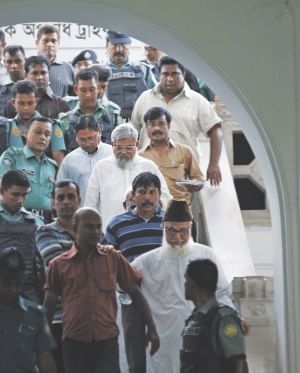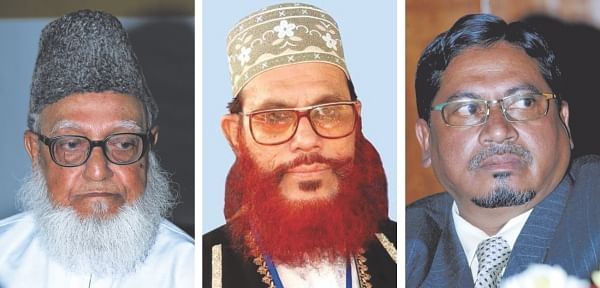| Home - Back Issues - The Team - Contact Us |
 |
| Volume 11 |Issue 13| March 30, 2012 | |
|
|
Current Affairs The Politics of Delay The government must take steps to finish the trial of the war criminals and the execution of its verdict within its tenure Ahmede Hussain Revolution Betrayed
It is indeed heartening to see the government make a new tribunal to put to dock those who have committed some of the most ghastly crimes in the history of the humanity. In fact, Jamaat-e-Islami (JI), Nejam-e-Islami, Muslim League and other like-minded parties and groups not only supported the marauding Pakistani army, the leaders and activists of these parties took up arms, formed different para-militia groups and seconded the Pakistani army in rape and butchery. It does not need a tribunal to tell us– ordinary Bangladeshis–that the Jamaat leaders who are facing charges of war crimes are criminals, that they had led genocides that can only be overshadowed in human history by the holocaust. Newspapers of the time and history books are littered with stories where Jamaat leaders actively participated and abetted in the massacre of 1971, which had witnessed the murder of three million people and the rape of 100,000 women. With its leaders putting their stamp of approval on the activities of the Pakistani occupation forces, it is no secret that Jamaat, as a political party, had participated in the rape and murder, and the demand for banning of Jamaat in independent, democratic Bangladesh is the order of the day. In fact, immediately after the independence of Bangladesh, these groups, who sell religion to garner public support, were banned. Gen Ziaur Rahman, who assumed power in a bloody coup after the brutal and barbaric murder of Bangabandhu Sheikh Mujibur Rahman, opened the gate of politics to the war criminals of 1971. One Step Forward, Two Steps Back It is a small wonder that in the first election after the country's second bourgeoisie revolution in 1990, the party bagged as many as 18 seats, and Khaleda Zia, Gen Zia's widow, took Jamaat's support to form government. A campaign led by writer Jahanara Imam and other freedom fighters was successful in limiting Jamaat's seats to the bare minimum in the next elections. Guilt and shame enveloped our conscience as a nation when Jamaat, after making an alliance with the BNP, became a junior partner in Khaleda's cabinet after the 2001 elections and two known collaborators of the Pakistani occupation forces were made ministers of independent Bangladesh. In fact, when it comes to rehabilitating the war criminals into politics, both the major political parties in Bangladesh should share the blame. During its movement for caretaker government (CG), the Awami League (AL), which led the country towards independence, had put joint political programmes with the Jamaat. It is only after popular demand was raised during the last CG's rule that the AL leadership, in its election speech, had talked about the trial of war criminals. After the AL has come to power, riding an electoral landslide in 2008, the government has made a tribunal to bring the war criminals to book.
What is to be Done? Jamaat, which fought against Bangladesh's Liberation War as a political entity, must be fought at different fronts. People who traditionally vote for Jamaat hail from poverty ridden areas across the country. Money plays an important role on election day when they make their choice of leaders. The government and the country's liberal, democratic forces should launch campaigns in these areas, especially the districts that border India, to make people aware about the disaster that might await the country at the bend of its history if they vote for Jamaat in the next elections. In fact, there is no reason that Jamaat should not be banned. If Jamaat cannot be outlawed merely for the sake of democracy and freedom of speech and association, the state and its machineries can fight an ideological battle against the party, which are still luring young people into their fold using Islam as a political ideology. There are some dim-witted, petty bourgeoisie elements in the society, infantile in their thinking, who equate religion with Jamaat and such groups. By doing so, they only expose their intellectual (if there is any) bankruptcy, making a fool of themselves. Like the way war on terror is fought, or Abdul Hamid Khan Bhashani – the Red Maulana – dedicated his life for the socialist cause, the imams at different mosques can be sensitised about the war criminals, and war crimes can be included in their Friday sermons. Meanwhile, we must not forget that presently we are standing at a crucial juncture in history. Delaying the trial of the war criminals runs the risk of making sure that those who committed dastardly acts like rape and mass murder come out free from prison. However much as we criticise the Sheikh Hasina-led government for its alleged failures in different sectors, we must not forget that it is under her leadership that infamous Rajakars and Al Badars like Matiur Rahman Nizami and Ali Ahsan Mojahed have been arrested. And their trial must see its inevitable end within this government's tenure. History will not forgive us if we fail to hand down justice to the war criminals whose hands are still red with the blood of the martyrs.
|
||||||||||
Copyright
(R) thedailystar.net 2012 |
|||||||||||

